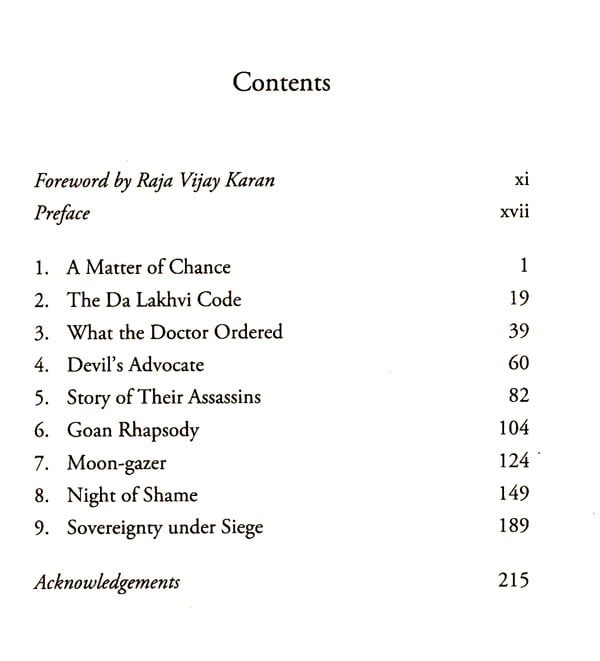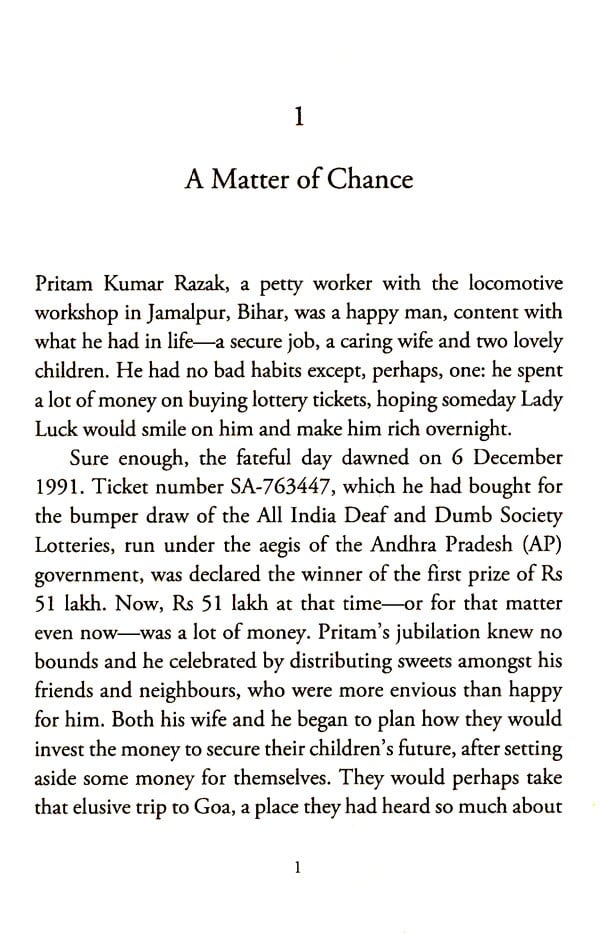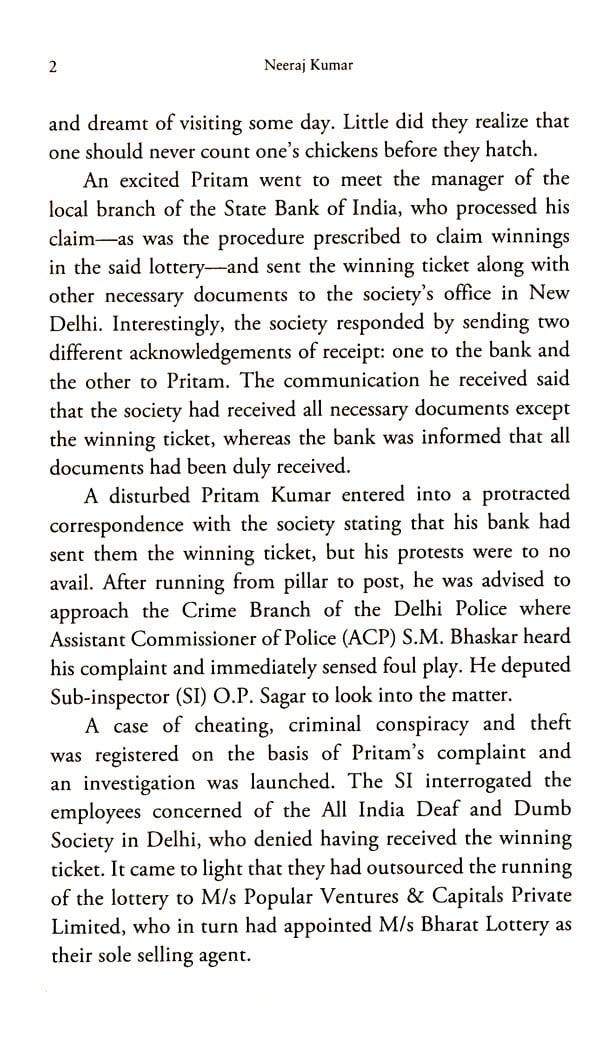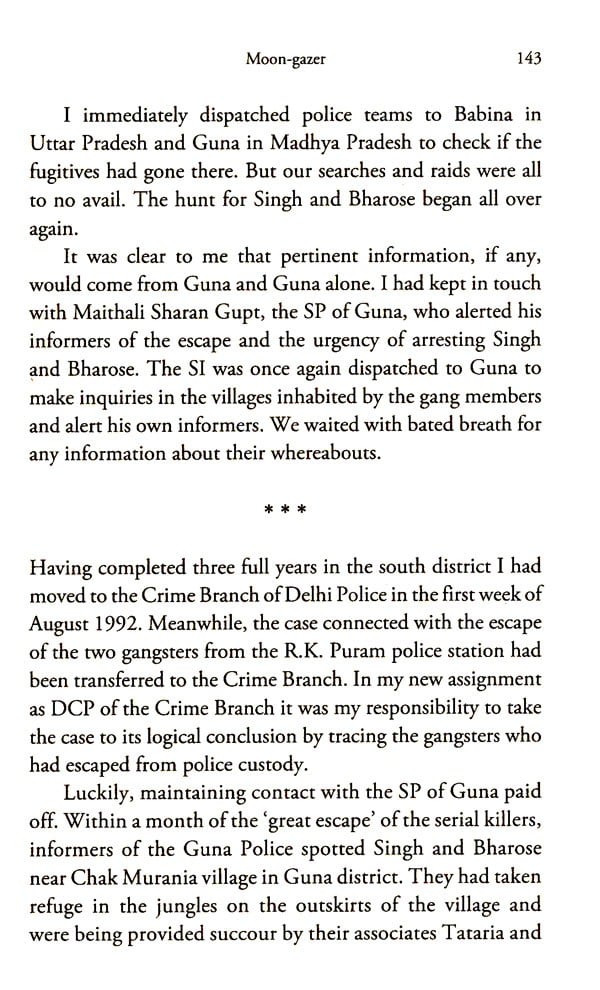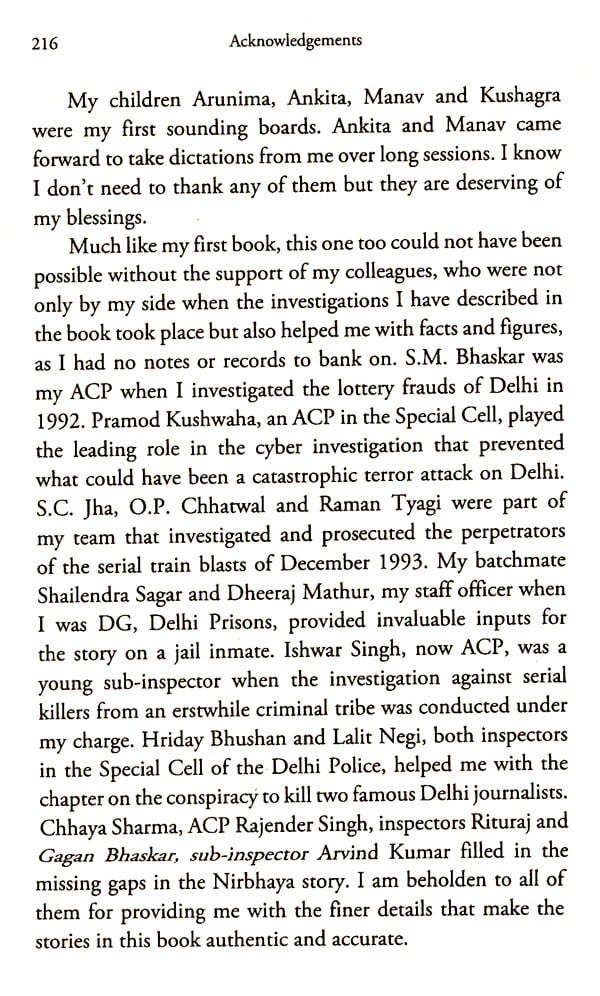
Khaki Files (Inside Stories of Police Investigations)
Book Specification
| Item Code: | AZB516 |
| Author: | Neeraj Kumar |
| Publisher: | Penguin Random House India Pvt Ltd |
| Language: | English |
| Edition: | 2019 |
| ISBN: | 9780143428008 |
| Pages: | 240 |
| Cover: | PAPERBACK |
| Other Details | 8.5 x 5.2 inches |
| Weight | 210 gm |
Book Description
An insider's account of the most daring police cases in the country
13 December 2001: Pakistan-based terrorists carry out an audacious attack on the Indian Parliament, killing eight security personnel and a gardener; the case is solved and all accused are arrested within seventy-two hours.
16 December 2012: A twenty-three-year-old physiotherapist is brutally gang-raped in a moving bus in Delhi; the case is cracked within five days despite the lack of initial leads.
In Khaki Files, Neeraj Kumar revisits many such high-profile cases of his career as an IPS officer—from the investigation of one of the biggest lottery frauds in the country to a foiled ISI (Inter-Services Intelligence) attempt to kill two of the founding members of Tehelka-bringing to light numerous achievements of the country's police forces, which are otherwise largely reviled and ridiculed.
Very rarely do we find a narrative that sits on the edge of such believability and impossibility'
Neeraj Kumar is one of the most distinguished officers to have served in the Indian Police. He joined the IPS in 1976 and retired as the commissioner of police, Delhi, in 2013.
While on deputation with the Central Bureau of Investigation (CBI), first as deputy inspector general and then as joint director, he investigated several sensational cases and conducted a number of transnational operations involving terrorism, organized crime, economic offences and corruption. He was later appointed as the joint commissioner of police, Special Cell of the Delhi Police—mainly responsible for tackling Pakistan-sponsored terrorism and the director general of prisons, Delhi.
In an illustrious career spanning thirty-seven years, Kumar held a range of high-profile assignments and ushered in novel initiatives, such as Padho aur Padhao, a literacy and placement scheme for prisoners; Aapka Update, a scheme for providing regular updates to complainants on police action; and Jan Sampark, a platform for members of the public to meet senior police officers and air their grievances.
Kumar represented India at the UN Convention on Transnational Organized Crime in Vienna and later at the drafting session of the UN Manual on Countering Kidnapping and Extortion. The Government of India recognized his good work by awarding him the Police Medal for Meritorious Service in 1993 and the President's Police Medal for Distinguished Service in 1999. Kumar, till recently, headed the Anti-corruption and Security Unit of the Board of Control for Cricket in India (BCCI).
Khaki Files is his second book, whose stories are the subject of a web series under production.
I had written my first book Dial D for Don with considerable trepidation and diffidence. Uncertain whether my writing skills were adequate to meet the exacting standards of a published work, I soldiered on, nonetheless, as I was confident that my stories were worthy of being told and heard. The book, an anthology of eleven accounts of Central Bureau of Investigation (CBI) operations conducted during the nine years I spent in the central investigative agency, was a decent success. Besides figuring on several bestseller lists for weeks, the book also elicited considerable interest from producers of web series, and film-makers were keen on buying the rights of the book. The overwhelming but humbling approbation makes both my publishers and me believe that there exists a considerable readership of true crime stories written in firstperson singular by a senior police officer.
The celebrated Mumbai-based crime writer S. Hussain Zaidi, who had initiated me into writing the first book, encouraged me to write again using the same template. Despite my initial reluctance, I decided, egged on by Milee Ashwarya of Penguin Random House and Zaidi sahib, to take another plunge.
I always thought writing the second book would be much easier than the first one. However, the experience of the first book had neither given me the habit nor the discipline of writing regularly. To make matters worse, my preoccupation with the Board of Control for Cricket in India (BCCI), as the head of its anti-corruption and security unit, denied me the right frame of mind necessary to start writing again. Fortuitously, by an unexpected turn of events, I quit my job with the cricket body on 31 May 2018. The following day I was on my desk and my writing resumed.
Khaki Files is a collection of nine stories based on my experiences in different assignments—ranging from deputy commissioner of police (DCP) of south district in Delhi to director general of police (DGP) of Goa, and finally as commissioner of police (CP) of Delhi. They cover over three decades of my career in the police. In most of these recollections, I was leading the investigations, and, in a couple of them—“Sovereignty under Siege' and 'Stories of Their Assassins'—I was a close witness to the probes. Two other stories— Devil's Advocate' and 'Goan Rhapsody do not strictly relate to investigations but are, I feel, interesting and readable nuggets from my memory bank. I sincerely hope the readers like these stories as much as they appreciated those in Dial D for Don.
When the author sounded me out to write the foreword to his second book, Khaki Files, I agreed without hesitation, though the word that came to my mind was déjà vu. But I was so impressed with his earlier work, Dial D for Don, that I welcomed his proposal most willingly. And, what a delightful experience it has been. Khaki Files is written so stylishly. What he has now produced is a thrilling work, not of fiction but real-life experiences that called for acutely skillful leadership, which he has displayed all along.
More than anything else, what fascinated me were the elements of autobiography (at times somewhat poignant), especially when it comes to his unpleasant personal experiences with some of his seniors and colleagues. Neeraj has shown grace and large-heartedness in not naming them. He has also avoided naming his political masters who meant him harm.
While each chapter is a fascinating experience, the first one on the lottery scam, ‘A Matter of Chance', made a huge impression. Apart from an occasional purchase of lottery tickets—what is called lotto in New York—I had no experience of lotteries. So Neeraj's narration was a shocking eye-opener. It shows that lotteries were never a matter of chance, but an organized racket by habitual cheats to dupe the common man. Those who repeatedly keep on trying their luck in lotteries are unaware that they are putting themselves at the receiving end of a game of fraud. In this story, a common man, Pritam Kumar Razak, in December 1991, wins Rs 51 lakh in a lottery. Naturally, he is overjoyed not knowing that what awaits him is not Rs 51 lakh, but an unending period of tension, disappointment and denial of what are his legitimate dues, all on account of a fraud perpetrated on him by a network of crooks. Had the author and his team not unearthed the scam run by these crooks, perhaps the racket of lotteries would have continued to hoodwink people for a long time. To the immense credit of Neeraj and his team of Delhi Police, lotteries by private persons and bodies are thereafter banned by an order of the Supreme Court, sparing the people of perpetual fraud.
**Contents and Sample Pages**
